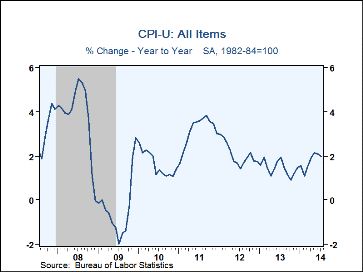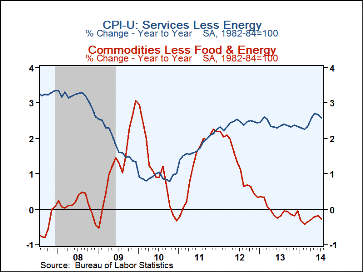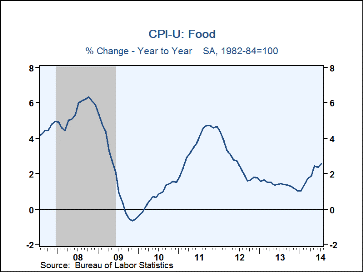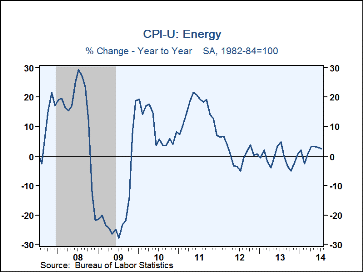 Global| Aug 19 2014
Global| Aug 19 2014U.S. Consumer Price Inflation at Five-Month Low
by:Tom Moeller
|in:Economy in Brief
Summary
The consumer price index ticked 0.1% higher (2.0%% y/y) during July following a 0.3% June gain. The reading was the easiest increase since February and matched consensus expectations in the Action Economics Forecast Survey. Consumer [...]
The consumer price index ticked 0.1% higher (2.0%% y/y) during July following a 0.3% June gain. The reading was the easiest increase since February and matched consensus expectations in the Action Economics Forecast Survey. Consumer prices excluding food and energy also ticked 0.1% higher (1.9% y/y) and fell short of expectations for a 0.2% increase.
Core service price pressure remained contained as they posted a second consecutive 0.1% uptick (2.6% y/y). Transportation services prices declined 0.7% (+1.8% y/y) following a 0.1% uptick in June. A 4.0% decline (-0.0% y/y) in public transportation costs led the weakness following a 0.3 June rise. Medical care service price inflation followed this weakness with a meek 0.1% rise (2.5% y/y) after an unchanged June level. Physician services costs fell 0.2% (+1.1% y/y), down for the second straight month. Tuition fees also gained 0.1% (3.4% y/y) following a 0.5% jump. Recreation services prices rose 0.2% (2.3% y/y) while shelter costs (32% of the CPI) advanced 0.3% (2.9% y/y) for the second time in three months. Owners equivalent rent of primary residences improved 0.3% (2.7% y/y) following three consecutive 0.2% increases.
Also under control were energy prices which declined 0.3% (+2.5% y/y) after the 1.6% jump during June. Gasoline prices fell 0.3% (+0.8% y/y) following a 3.3% surge. Electricity prices also were off 0.3% (+4.0% y/y) after a 0.2% gain. Natural gas prices fell 0.4% (+6.9% y/y), down for the third straight month, while fuel oil prices declined 0.7% (+2.2% y/y), posting the fifth consecutive decline.
Food prices strengthened 0.4% (2.6% y/y) after an easier 0.1% uptick. Nonalcoholic beverage prices increased 0.5% (-0.1% y/y) following no change. Cereal and bakery product prices rose 0.4% (0.3% y/y) after three months of decline. Meat prices gained 0.3% (9.3% y/y) for a second month. Dairy prices rose 0.3% (4.3% y/y) following a 0.4% drop while fruit & vegetable prices were unchanged (2.0% y/y) following a 0.3% decline.
Still showing weakness were goods less food and energy prices which were unchanged (-0.3% y/y). They've been unchanged since December. To the strong side were new vehicle prices, up 0.3% (0.2% y/y) but that just reversed a June increase. Medical care commodity prices also gained 0.3% (3.0% y/y) after a 0.7% jump. In addition, appliance prices rose 0.3% (-4.2% y/y), the first increase in nine months. Apparel prices improved 0.2% (0.5% y/y) after a 0.5% rise. To the downside, furniture & bedding prices declined 1.3% (-3.1% y/y) after three months of modest increase. Audio & video product prices were off a record 1.9% (-7.9% y/y).
The consumer price data is available in Haver's USECON database while detailed figures can be found in CPIDATA. The expectations figure is from Action Economics and is found in the AS1REPNA database.
| Consumer Price Index (%) | Jul | Jun | May | Jul Y/Y | 2013 | 2012 | 2011 |
|---|---|---|---|---|---|---|---|
| Total | 0.1 | 0.3 | 0.4 | 2.0 | 1.5 | 2.1 | 3.2 |
| Total less Food & Energy | 0.1 | 0.1 | 0.3 | 1.9 | 1.8 | 2.1 | 1.7 |
| Goods less Food & Energy | -0.0 | 0.1 | 0.1 | -0.3 | -0.0 | 1.3 | 1.3 |
| Services less Energy | 0.1 | 0.1 | 0.3 | 2.6 | 2.4 | 2.4 | 1.8 |
| Food | 0.4 | 0.1 | 0.5 | 2.6 | 1.4 | 2.6 | 3.7 |
| Energy | -0.3 | 1.6 | 0.9 | 2.5 | -0.7 | 0.9 | 15.2 |
Tom Moeller
AuthorMore in Author Profile »Prior to joining Haver Analytics in 2000, Mr. Moeller worked as the Economist at Chancellor Capital Management from 1985 to 1999. There, he developed comprehensive economic forecasts and interpreted economic data for equity and fixed income portfolio managers. Also at Chancellor, Mr. Moeller worked as an equity analyst and was responsible for researching and rating companies in the economically sensitive automobile and housing industries for investment in Chancellor’s equity portfolio. Prior to joining Chancellor, Mr. Moeller was an Economist at Citibank from 1979 to 1984. He also analyzed pricing behavior in the metals industry for the Council on Wage and Price Stability in Washington, D.C. In 1999, Mr. Moeller received the award for most accurate forecast from the Forecasters' Club of New York. From 1990 to 1992 he was President of the New York Association for Business Economists. Mr. Moeller earned an M.B.A. in Finance from Fordham University, where he graduated in 1987. He holds a Bachelor of Arts in Economics from George Washington University.
More Economy in Brief
 Global| Feb 05 2026
Global| Feb 05 2026Charts of the Week: Balanced Policy, Resilient Data and AI Narratives
by:Andrew Cates










